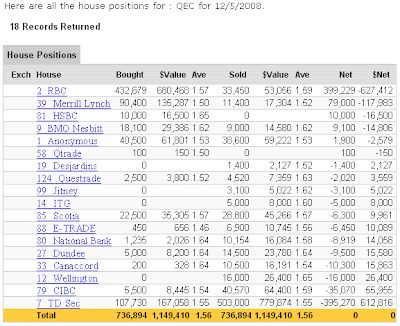From Canaccord Report (2 Dec. 2008),
Potential Utica Valuation Potential Utica
$/share Leverage as % per s/price
Gastem GMR $ 2.12 311%
Junex JNX $11.38 749%
Questerre QEC $6.33 335%
"Best leverage to the upside on the play remains with these small-cap players (GMR-V,
JNX-V and QEC-T)"
Note: no time frame in that report.




December 4, 2008-La Visitation #1 Successfully Cased as Shale Gas Well
00:15 EST Thursday, December 04, 2008
CALGARY, ALBERTA--(Marketwire - Dec. 4, 2008) -
NOT FOR DISTRIBUTION ON U.S. NEWSWIRE SERVICES OR FOR DISSEMINATION IN THE UNITED STATES
Questerre Energy Corporation ("Questerre" or the "Company") (TSX:QEC)(OSLO:QEC) announced today that the operator has completed drilling of the La Visitation #1 well in the St. Lawrence Lowlands, Quebec.
The well was drilled to target depth of 2770m and logged to evaluate the Utica and Lorraine shale/siltstone zones as well as the carbonates of the Trenton Black-River Group. Based on an analysis of the logs, the well has been cased for shale gas testing, which will be undertaken when equipment is available.
Michael Binnion, President and Chief Executive Officer of Questerre, commented, "Drilling results were encouraging as we encountered several naturally fractured intervals in the Lorraine and Utica and promising gas shows."
Drilling operations on the next well, St. David, are expected to commence later this month.
Questerre also reported on the status of re-completion operations on the Gentilly #1 vertical well. Following the stimulation and 800 mcf/d test from the Utica, two intervals in the shallower Lorraine horizon were also fracture stimulated.
Questerre is a Calgary-based independent resource company actively engaged in the exploration, development and acquisition of high-impact exploration and development oil and gas projects in Canada.
This news release contains forward-looking information. Implicit in this information are assumptions regarding commodity pricing, production, royalties and expenses, that, although considered reasonable by the Company at the time of preparation, may prove to be incorrect. These forward-looking statements are based on certain assumptions that involve a number of risks and uncertainties and are not guarantees of future performance.
Barrel of oil equivalent ("boe") amounts may be misleading, particularly if used in isolation. A boe conversion ratio has been calculated using a conversion rate of six thousand cubic feet of natural gas to one barrel of oil and is based on an energy equivalent conversion method application at the burner tip and does not necessarily represent an economic value equivalent at the wellhead.
This news release does not constitute an offer of securities for sale in the United States. These securities may not be offered or sold in the United States absent registration or an available exemption from registration under the United States Securities Act of 1933, as amended.
FOR FURTHER INFORMATION PLEASE CONTACT:Questerre Energy Corporation
Anela Dido
Investor Relations
(403) 777-1185
(403) 777-1578 (FAX)
Email: info@questerre.com
Website: www.questerre.com



